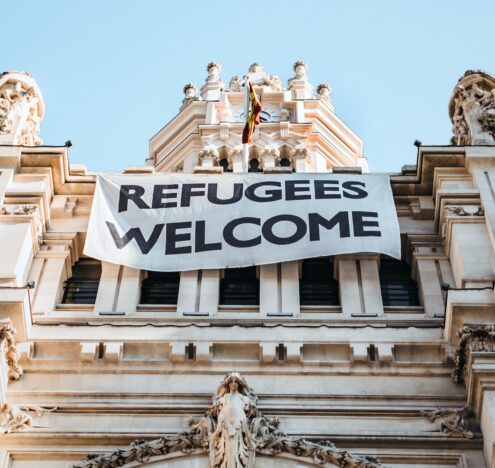They came at night. Masked gunmen first broke down the door of his home, and then threw his wife to the ground when she stepped in their way. They found his son and dragged him outside, beating him along the way for good measure. The father followed, begging the men to stop. He asked if they were looters and offered them money. But no, one of them replied, “we’re with the government.” They hauled his son across the yard and threw him into the back of a truck emblazoned with the federal seal.
Say what you will about al-Maliki’s goons, at least they had the courtesy to identify themselves.
Americans have been horrified in recent weeks by similar scenes unfolding in their own cities. Anonymous paramilitary operatives who refuse to identify themselves have begun to stalk their neighborhoods, on the orders of the President of the United States. These men have shot protestors in the face with so-called ‘non-lethal’ munitions. They’ve pepper-sprayed an elderly Vietnam veteran, among many others. They’ve snatched citizens off the streets without charge and tossed them into the back of an unmarked van —what any reasonable observer could only describe as kidnapping. They have achieved their apparent purpose of turning a city like Portland — until recently best known as a haven for eccentric hipsters — into a battleground.
Indeed, President Trump has called it such. Desperate to find anything to distract from his historically-inept handling of a global pandemic that has claimed the lives of hundreds of thousands of our citizens, the President has shamelessly appropriated the language of war, violence, and atrocity. He declared Portland’s citizens to be violent anarchists who have “waged war” against ordinary Americans. Claiming to “have no choice,” he has threatened to “go in and clean it out.” He went as far as to declare his own “surge” of federal forces into Portland and other cities, regardless of the wishes of their people and without the consent of their elected representatives.
I deployed with my unit to Baghdad in 2007, ostensibly to protect the Iraqi people from al-Qaeda terrorists. The city was then a roiling cauldron of killing.
That last bit struck me because I participated in the original surge — the Bush administration’s last-ditch effort to end the sectarian war we had unleashed upon Iraq. This is something President Trump knows nothing about and can never understand. It seems like a lifetime ago now, but there are some things you can never forget.
I deployed with my unit to Baghdad in 2007, ostensibly to protect the Iraqi people from al-Qaeda terrorists. The city was then a roiling cauldron of killing. The sound of rockets, mortars and car bombs composed a daily staccato rhythm; columns of thick black smoke frequently adorned the city’s skyline. Al-Qaeda was there, alright. The unit we replaced had spent months uprooting a determined al-Qaeda “alamo” strongpoint in the center of a heavily-populated city block, costing hundreds of American casualties. But we quickly learned that some of the terrorists weren’t al-Qaeda at all; some of them in fact wore the uniforms of the Iraqi government that we had installed.
We worked closely with Iraqi Army and Federal Police through embedded training teams that lived and worked with our counterparts. Our mission was to advise them in the conduct of counterinsurgency operations — admittedly, something we ourselves knew next to nothing about after only a week of PowerPoint presentations in nearby Taji. But it was also in no small part to keep an eye on the Iraqi forces — particularly those with a reputation for sectarian violence.
One of Iraq’s many intractable problems was endemic factionalism, a common characteristic of low-trust societies. There, the Sunni minority had ruled over the Shia majority for decades, through the brutal apparatus of the Baath Party. In the reality inaugurated by Coalition Provisional Authority Order No. 1, the newly empowered Shiite leaders felt it was payback time.
Shiite hardliners took power after the national elections of 2005 and stuffed Iraq’s ministries with loyalists, issuing guns and identification cards to their thugs. They took control of the powerful Ministry of the Interior and its Iraqi Federal Police, giving them state-sanctioned legitimacy to carry out a campaign of ethnic cleansing.
By the time my unit arrived, American operations centers were inundated with reports of federal police officers beating, maiming, or killing Sunni suspects or running off-book torture houses where they broke fingers and sawed through limbs. American forces discovered mutilated corpses daily — dumped in rubbish piles, hanging from streetlights, or washed up on the shores of the Tigris. Overwhelmingly Sunni, these bodies bore the mark of the most gruesome kinds of torture: cigarette and acid burns, nails hammered into skulls, gouged out eyes. In just one gruesome example, a Sunni interpreter who worked for my unit was found one morning hanging from a light pole, his naked body riddled with holes made by an electric drill. At the height of this sectarian war that we had unleashed, up to 1,200 civilians were murdered every month in Baghdad, making it by far the deadliest city on earth.
The Iraqi Federal Police were often used by Iraqi Prime Ministers as a personal shock force — most notoriously by Nouri al-Maliki, perhaps the individual most singly responsible for hastening the rise of the Islamic State. An authoritarian at heart, Maliki appointed himself Minister of the Interior during his second term as Prime Minister, during which he frequently used the Federal Police as a cudgel to bludgeon his political foes — including during nationwide protests in 2013 that fueled the rise of ISIS.
Comparing a few noteworthy incidents of violence against protestors in the United States to a corrupt dictator’s sustained campaign of kidnapping and torture may seem a wild exaggeration. Thankfully, it is, for now at least. But as I watched the crises unfolding in American cities this summer in granular, high-definition video, these memories freshly stirred in my mind. I wondered how many of the masked federal law enforcement officers roughing up the citizens of Portland were veterans of the Iraq War, like me. The sad irony, I realized, was that while we tried to make Iraq’s institutions more like ours; it was ours that had become more like theirs.
After facing widespread condemnation for attempting to use the military as a domestic police force in June, President Trump realized he had something better: the Department of Homeland Security, an immature magpies’ nest of federal law enforcement entities glommed together in the confused and hasty response to the terrorist attacks of 9/11. In addition to having more law enforcement officers than the FBI, ATF, and DEA combined, it possesses many of the military’s capabilities — particularly the ones the President wants to use against his political foes — with hardly any of the institutional maturity or Congressional oversight.
Today, it is led by a partisan appointee who we now know was not only illegally-installed but lacks any legal background — making it ripe for use as what Governor Tom Ridge, a lifelong Republican and the very first Secretary of Homeland Security, called “the president’s personal militia.” As for Trump’s repeated threats to surge forces into other cities, Ridge said it would be “akin to an invasion.” He’s right.
Unlike Iraq, the United States has a legislative body with the legitimacy and the authority to condemn and remedy these abuses, if only it can find the will to do so. I hope Congress acts swiftly to condemn the misuse of the Department of Homeland Security and revisit some of the expansive authorities it’s granted DHS over the years. Those of us who went to Iraq during the surge did not go there only to come back and find Baghdad at our doorsteps.
Zachery Tyson Brown is a strategic futurist working at the intersection of disruptive technology, organizational design, and national security. A United States Army veteran who served in Iraq and Afghanistan, Zach is now a Security Fellow at the Truman National Security Project, proclaimed US Army Futures Command “Mad Scientist,” and a Military Writers Guild Board Member.





















